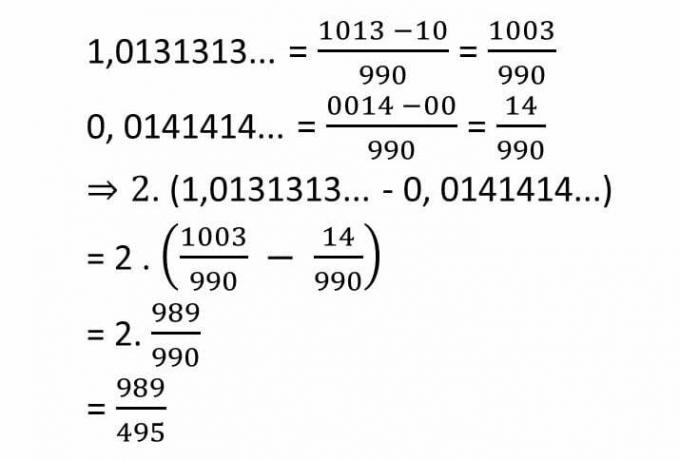
The numbers that show decimal numbers that repeat indefinitely are called repeating decimals. For these numbers, we can determine fractions correspondents, which are called generating fractions.
A generating fraction can be found for both a simple repeating decimal and a repeating decimal. compound or mixed periodic, which is when the decimal has some decimals that are not repeated in addition to those that are repeat.
see more
Students from Rio de Janeiro will compete for medals at the Olympics…
The Institute of Mathematics is open for registration for the Olympics…
To understand more about this subject, see a list of solved exercises on generating fraction.
Question 1. Calculate the generating fraction of each of the simple repeating decimals:
a) 3.21212121…
b) 1.888888…
c) 0.26262626…
d) 12.33333…
e) 17.89898989…
Question 2. Calculate the generating fraction of each of the compound repeating decimals:
a) 1.133333….
b) 3.563636363…
c) 17.415151515…
d) 0.244444…
e) 5.01209209209…
Question 3. Find the generating fraction to perform the following operations between decimal numbers:
a) 1.1212121212… + 1.17
b) 23.012121212… + 1.14141414…
Question 4. Using a generating fraction, find the result of the following operation:
3. (1,0131313… – 0, 0141414…)
Question 5. Using a generating fraction, find the result of the following operation:
0,54 + 3/5 – 1,22222… + 1,133333…


Even exact decimal numbers, that is, which are not repeating decimals, can be written as a fraction with the denominator being a multiple of 10.
So first let's write each of the decimal numbers as a fraction and then calculate the least common multiple to carry out the sum of fractions.



You may also be interested:


